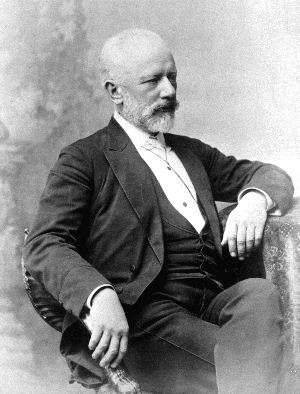| B i o g r a p h y |
 Pyotr Ilyich Tchaikovsky born April 25 [May 7, New Style], 1840, Votkinsk, Russia died October 25 [November 6], 1893, St. Petersburg.
Pyotr Ilyich Tchaikovsky born April 25 [May 7, New Style], 1840, Votkinsk, Russia died October 25 [November 6], 1893, St. Petersburg.
Tchaikovsky also spelled Chaikovsky, Chaikovskii , or Tschaikowsky name in full Anglicized as Peter Ilich Tchaikovsky the most popular Russian composer of all time. His music has always had great appeal for the general public in virtue of its tuneful, open-hearted melodies, impressive harmonies, and colourful, picturesque orchestration, all of which evoke a profound emotional response. His oeuvre includes 7 symphonies, 11 operas, 3 ballets, 5 suites, 3 piano concertos, a violin concerto, 11 overtures (strictly speaking, 3 overtures and 8 single movement programmatic orchestral works), 4 cantatas, 20 choral works, 3 string quartets, a string sextet, and more than 100 songs and piano pieces.
Tchaikovsky was the second of six surviving children of Ilya Tchaikovsky, a manager of the Kamsko-Votkinsk metal works, and Alexandra Assier, a descendant of French émigrés. He manifested a clear interest in music from childhood, and his earliest musical impressions came from an orchestrina in the family home. At age four he made his first recorded attempt at composition, a song written with his younger sister Alexandra. In 1845 he began taking piano lessons with a local tutor, through which he became familiar with Frédéric Chopin's mazurkas and the piano pieces of Friedrich Kalkbrenner. Since music education was not available in Russian institutions at that time, Tchaikovsky's parents had not considered that their son might pursue a musical career. Instead, they chose to prepare the high-strung and sensitive boy for a career in the civil service.
In 1850 Tchaikovsky entered the prestigious Imperial School of Jurisprudence in St. Petersburg, a boarding institution for young boys, where he spent nine years. He proved a diligent and successful student who was popular among his peers. At the same time Tchaikovsky formed in this all-male environment intense emotional ties with several of his schoolmates.
In 1854 his mother fell victim to cholera and died. During the boy's last years at the school, Tchaikovsky's father finally came to realize his son's vocation and invited the professional teacher Rudolph Kündinger to give him piano lessons. At age 17 Tchaikovsky came under the influence of the Italian singing instructor Luigi Piccioli, the first person to appreciate his musical talents, and thereafter Tchaikovsky developed a lifelong passion for Italian music. Wolfgang Amadeus Mozart's Don Giovanni proved another revelation that deeply affected his musical taste. In the summer of 1861 he traveled outside Russia for the first time, visiting Germany, France, and England, and in October of that year he began attending music classes offered by the recently founded Russian Musical Society. When St. Petersburg Conservatory opened the following fall, Tchaikovsky was among its first students. After making the decision to dedicate his life to music, he resigned from the Ministry of Justice, where he had been employed as a clerk.
Tchaikovsky spent nearly three years at St. Petersburg Conservatory, studying harmony and counterpoint with Nikolay Zaremba and composition and instrumentation with Anton Rubinstein. Among his earliest orchestral works was an overture entitled The Storm (composed 1864), a mature attempt at dramatic program music. The first public performance of any of his works took place in August 1865, when Johann Strauss the Younger conducted Tchaikovsky's Characteristic Dances at a concert in Pavlovsk, near St. Petersburg.